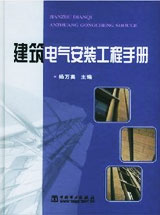
主要责任者: 杨万高
责任方式: 主编
出版者: 中国电力出版社
出版地: 北京
字数: 1603 千字
页码: 3-925
开本: 16
中图分类号: TU85-62
装帧: 精
语种:中
定价:98.00
出版时间:2005-07
丛书多卷书否:否
书目简介:本册工具书共收录174条词条。
被引频次:2
| 词条 | 建筑电气安装工程手册 |
| 类别 | 中文百科知识 |
| 释义 |  主要责任者: 杨万高 责任方式: 主编 出版者: 中国电力出版社 出版地: 北京 字数: 1603 千字 页码: 3-925 开本: 16 中图分类号: TU85-62 装帧: 精 语种:中 定价:98.00 出版时间:2005-07 丛书多卷书否:否 书目简介:本册工具书共收录174条词条。 被引频次:2 |
| 随便看 |
开放百科全书收录579518条英语、德语、日语等多语种百科知识,基本涵盖了大多数领域的百科知识,是一部内容自由、开放的电子版国际百科全书。